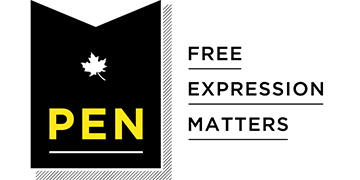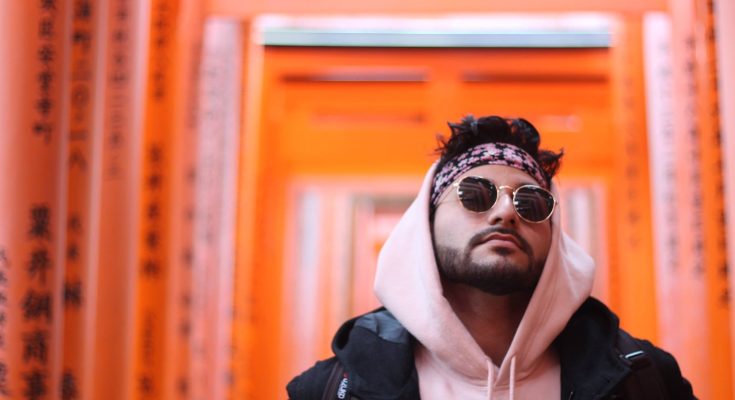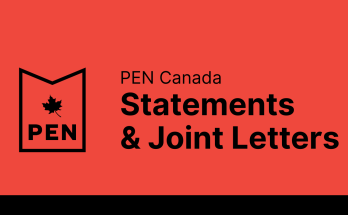June 24, 2022 — Fareh Malik, a spoken word poet and author from Hamilton, Ontario has won the 2022 RBC/PEN Canada New Voices Award. The jury described the excerpt from his collection, Streams That Lead Somewhere (forthcoming from Mawenzi House) as an intense “portrait of what it’s like to feel othered and alienated by daily doses of hate.” The citation noted the poems’ “tenderness and throat-grabbing use of imagery” and Malik’s “wide range of voices and tones to convey a nuanced spectrum of emotions and a laser sharp critique of Canada’s blatant and covert systemic racism.”
The RBC/PEN Canada New Voices Award recognizes emerging writers across multiple genres. Unpublished writers submit short fiction, poetry and creative nonfiction. This year’s competition received 280 entries from across Canada. The winner of the New Voices Award receives a $3,000 cash prize and four months of mentorship from a distinguished Canadian writer. Previous winners of the award include Claire Battershill, Mikko Harvey, Laura Legge, Noor Naga, Jaclyn Desforges, Emily Dial and Deepa Rajagopalan.
The New Voices Award is sponsored by the RBC Emerging Artists program which supports the arts and the role they play in building vibrant communities and strong economies. Every year the RBC Foundation donates millions of dollars to hundreds of arts organizations globally to help emerging artists become established. The initiative has helped more than 28,000 emerging artists since 2015.
Photo credit (above): Charles Escobido
Finalists:
Queer Love as Quantum Entanglement (Quantum Entanglement Suite) — Cassandra Myers
A Mnemonic for Desire — Catherine St. Denis
Kijiji BFF — Sara Mang
A Future, Together —Micah Killjoy
Finalists receive a complimentary PEN Canada membership.
********
Jury Citations
Streams That Lead Somewhere — Fareh Malik
“A white man called me that same tired word
terrorist
(don’t worry, I’m used to it)”
“it is the thing that makes
every single mirror in your home feel empty
not unlike
the way no one actually pays attention to fireworks
on their way down —
…depression feels like
having your brightest flash, then
falling from the sky
accompanied by your own ashes”
Ignited by the word terrorist in the opening poem “Chai”, this powerful collection boils with intensity. A raw and real portrait of what it’s like to feel othered and alienated by daily doses of hate, this work stands out for its tenderness and throat-grabbing use of imagery. Islamophobia is a landscape of quicksand skin, snatched hijabs, and bomber jackets that can’t be worn because they are called bomber jackets. Slurs, epithets and stereotypes, mistaken identity and gun violence woven across themes of friendship, kinship and ancestry, these poems employ a wide range of voices and tones to convey a nuanced spectrum of emotions and a laser sharp critique of Canada’s blatant and covert systemic racism. A tight collection, no soft landings.
Queer Love as Quantum Entanglement (Quantum Entanglement Suite) — Cassandra Myers
 “Particle (B) laughed,
“Particle (B) laughed,
of course they laughed!
A sky-crackle, cottoncandy cloud squeal
Or the first time (B) wanted to say I love you
(A) opened their mouth
said it for the both of them…”
In the slow dance between particle (A) and particle (B), this work stands out for its thoughtful use of space. In the text and on the page, space is a barrier, a holding, a provocation, a (C)haracter whose voice is ever present. Spanning science, technology and human experience, the poems explore interaction and intimacy and the untraumatizing effect of love. This collection displays a playfulness and a confidence in its use of form and an impressive precision of language.
Photo credit: Em Dial
A Mnemonic for Desire — Catherine St. Denis

“Afterwards my counsellor told me, People are animals.
I thought she was talking about him, the taking. But an octopus is both prey
and predator. It has 280 suckers per arm, each one a mnemonic for desire. My desire?
To open a single, slitted eye, reach my tentacles to the unwitting moon, destroy the whole fucking tide.”
“…Imagine yourself squeezing through a hole the size of your palm…”
How do you “put your sadness in its upright and locked position”? This collection is drenched in vivid, surprising imagery that is both complex and cohesive. A meditation on dis/connection and be/longing, this work is held together by its attention to place—a wrist marked by a red scab “collection of em dashes” to a body “wrapped in vast prairies and tucked in the edges.” Tight, heavy, questioning and claustrophobic the poems move like the bodies within them, human, animal, metaphor—emerging, escaping, morphing, transforming.
Photo credit: Robin Love
Kijiji BFF — Sara Mang

“Delete items? You cannot undo this action.
She leans over and spits in the sink.
Delete.”
“Anna piles slices of prosciutto on a piece of bread and opens her mouth so wide, Elena can see the silver fillings of her molars.”
This piece offers a compelling look at social media, corporate culture and relationships, where true friends are team members and the consumer is consumed. Excited by the prospect of a new best friend with pool-side perks, Elena becomes aware of the transactional nature of their friendship. Driven by a propulsive narrative, the inevitable and not-so-unexpected conclusion illustrates how vulnerable we are as late capitalism infiltrates interpersonal relationships.
Photo credit: Georgina McGrath Power
A Future, Together — Micah Killjoy
“I am tired of all the memorials, or the memorials we are unable to have due to physical distancing. We built this relationship to drugs but seem unable to tear it down and give it the funeral it deserves.”
“Do we not all, at certain points, have the desire to sublimate the self and completely turn off the nonstop caterwauling of the consciousness?”
In a numb and colourless world— what colour the crocuses? what palette her lipsticks? — this empathic narrator hovers over the landscape at a familiar distance, attempting to humanize the “criminal addict” or the “morally weak.” The author presents an insightful, intimate and timely argument about the devastating impact of stigma and government inaction in the face of Canada’s opioid epidemic.
Jurors: Chantal Gibson, Eva Crocker, Hasan Namir





